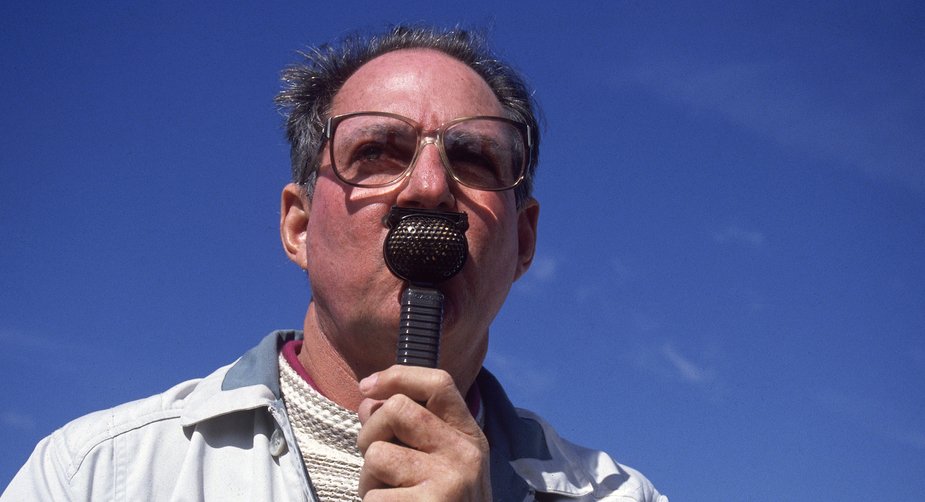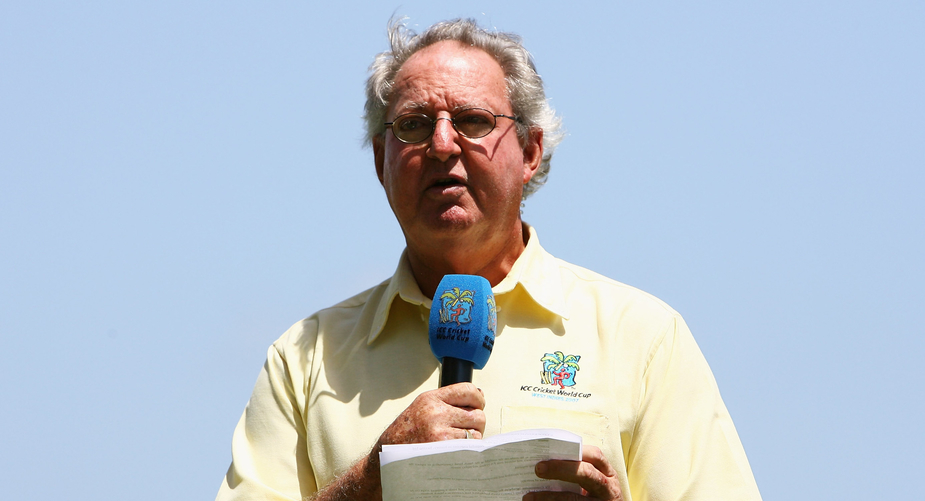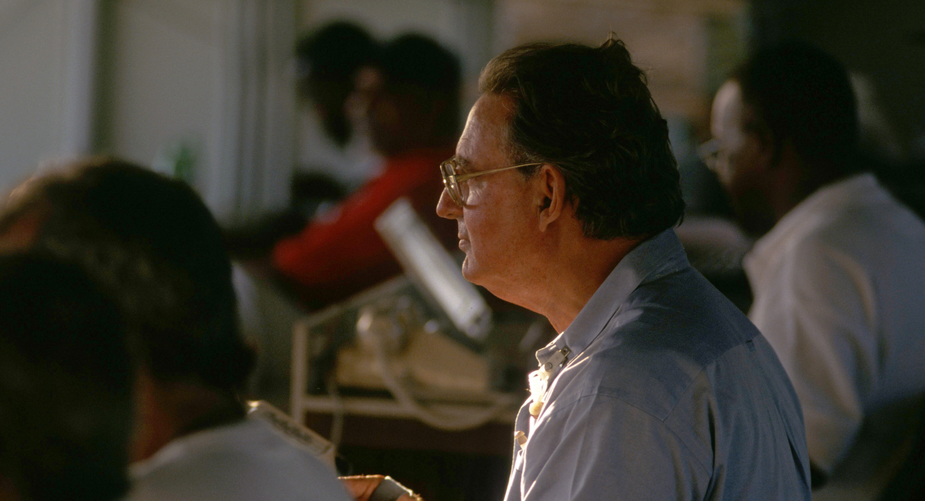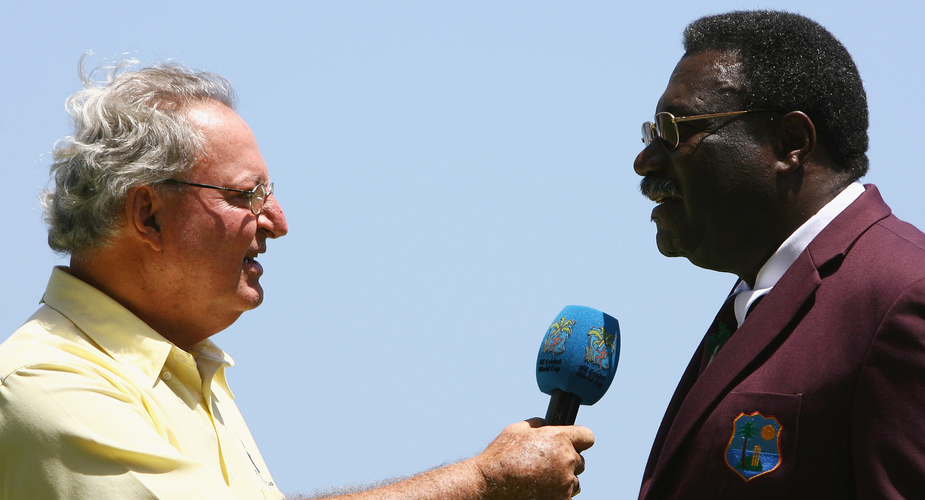‘Tony Cozier was an artist, technician & guru … He was my Yoda’ – Dan Norcross

In a Barbados special edition of the The Nightwatchman, Dan Norcross salutes a man who played a key part in his childhood and career – commentary legend Tony Cozier.
It’s not that I’m a peculiarly stoic fellow. I can cry. In fact I cry regularly. I cried when Wimbledon won the FA Cup in 1988. I cried when England won the Ashes in 2005. I cried when Alex Higgins cried. I even cry when a moderately talented kid from a broken home with mild behavioural problems doesn’t completely murder an Adele track on X Factor and is told by an inane judge/employee of Syco Productions that she is world-class, was born to sing and will be able to uproot her family from Tower Hamlets to a detached mansion in Cobham from the proceeds of her first album. And I don’t even like Cobham.
In short, I am an easily manipulated man who weeps salt tears of joy at the drop of a hat. But I don’t cry when people I don’t know succumb to the cruel inevitability of the human condition. Princess Diana, John Lennon, Prince, David Bowie? As a colleague once said to me: “Well, Dan, that’s entropy, innit.” And he’s probably right.
But on May 11, 2016, gazing out over a sun-drenched beach in the heart of San Sebastián with a jug of sangria and a delicious selection of pintos waiting for me, I saw a tweet and began spontaneously sobbing. Tony Cozier had just died. In the moment I wasn’t sure why I was sobbing. I felt more than a little daft trying to explain to my partner of 20 years what had elicited this atypical reaction, and have spent considerable hours since then trying to make sense of what I was feeling, and indeed still do feel.

Cozier, pictured here in 2007, was famed for his encyclopaedic knowledge of the game
I only met Tony, or Mr. Cozier to me, the once; it was at the Cricket Writers Club dinner in 2014. I had just finished my first season working as a cricket commentator for the BBC and a colleague very kindly effected an introduction. The moment Tony spoke I was in raptures, so enchanted by his presence that words just came tumbling out of my mouth. He tolerated my undignified adoration with a modest smile, and then, to shut me up I presume, adjusted my badly assembled tie with the gentlest of hands. Through this one very personal and intimate gesture my composure returned. We chatted for no more than five minutes and that was that. But what a five minutes it was.
Cricket commentary, you see, is very much my obsession. I commentated my first hundred at Lord’s in 1976 aged seven, trying to ape in my head the perfect cadences of John Arlott, Don Mosey and, of course, Tony Cozier as they described my precocious exploits. And it was always Tony Cozier who was on the mike for the dismissive cover drive off Andy Roberts that not only took me to my historic landmark of 288, thereby surpassing RE Foster’s record on “dayboo”, but also won England the match from an impossible position at the end of day two.
“Norcross will be absolutely joooobilant at levelling the series in front of an ecstatic crowd. England have not only discovered in this prodigiously gifted seven-year-old a long-term replacement for the absent Boycott, but also a cricketer who stands comparison to the true greats of the game. He drives with the elegant grace of Everton Weekes, cuts with the ferocity of the recently ennobled Sir Garfield Sobers and struts with the brooding presence of Vivian Richards. What a player.”
So when I was suddenly in front of Tony Cozier two years ago, hearing his words, watching his face animate and his mouth move, it was for me the equivalent of a Catholic gaining an audience with the Pope, or a Led Zeppelin fan being given a private rendition of Whole Lotta Love in their garage. Because Tony Cozier was an artist, a technician and a guru in one. He was my Yoda. My Dumbledore. My Aristotle.
I yearned to spend a month with him on the Planet Dagobah being taught the mystical ways of “Immaculate Vocal Rise and Fall”, or a term at Hogwarts honing his “Perfect Economy Of Language Spell”. For those special five minutes I was a young Alexander The Great being grounded in all the necessary skills required for benign world domination.

Cozier’s unrelenting enthusiasm for cricket earned him many an avid supporter
What made Tony Cozier so special is both easy to describe and impossible to emulate. You will hear much made of his extraordinary technical versatility; of his ability seamlessly to switch from the TV box, where commentary is much more like expert summary and Richie Benaud’s dictum of “less is more” rules, to the radio studio where dead air is a criminal offence and detailed, precise description of the action is paramount. And yes, he was fantastically good at that. John Arlott, after all would tend to nod off during his stints on TV, once famously getting through a full half hour spell without saying a word. But it wasn’t because Arlott wasn’t up to the job; just that occasionally he didn’t feel like playing ball.
Tony Cozier always played ball, despite commentating for over 50 years. But diligence and professionalism, whilst being admirable virtues, do not explain the unique quality of his commentary style. Rather it was that the watcher or listener was transported to a beguiling, exciting, familiar but transfixing place whenever he was on commentary. His voice evoked memories of the first time you heard it (in my case 1976) while firmly placing you in the here and now.
He was the ultimate Borgesian broadcaster; able to exist in the present and the past simultaneously. For a game obsessed with its traditions whilst constantly seeking to reinvent itself and meet the challenges of “relevance”, Cozier was a gift from the gods.
Much is made of his encyclopaedic knowledge of the game but the manner in which he used his knowledge was just as important, if not more so. There is a temptation when commentating to prove one’s credentials; to find facts, make allusions to and comparisons with abstruse events as a means of elevating oneself and justifying one’s position behind the microphone. Cozier never did this. If he had a more complicated point to make he would find an accessible way to make it. He would make the listener feel both informed and clever at the same time and would achieve this special alchemy through a combination of generous interplay with his co-commentator and the sheer sympathy that his voice engendered.
And what a voice. The standard description is “a Bajan lilt”. But it was more than that. His voice carried an urgency, a motive force that mirrored the events on the field. During a long and languid partnership his tone would be lower, his speech slower. He conveyed the stability of the situation through the pace of his words. It would be during these periods that he would occasionally be playful, teasing the listener with gently perambulating anecdotes and recollections.
A wicket would fall, and suddenly he was three tones higher. He would describe the field more precisely and frequently. The tempo of his voice would rise, reflecting the bowler’s renewed sense of purpose and the new batsman’s vulnerability. You felt you could gauge the state of the game without knowing the score, what day it was or indeed have any context other than the intensity, speed and pitch of that voice.
That is more than a technical skill. It is what happens when you rise beyond conscious deliberation of your art into a state of being in which you are the vocal embodiment of what is happening around you. It is scarcely believable. It is barely human. In these moments, Tony Cozier seemed not to be made of flesh and blood but rather of the very essence of cricket itself.
And of course he was white. Why does this matter? In almost every sense, of course, it doesn’t matter. Not in the least. But when the 11-year-old me discovered he was white it had a profound effect.
Being a white middle-class boy, growing up near The Oval in the late 1970s and early 80s was to be confronted by racial tensions that abounded at that time. To be a cricket fan into the bargain, watching his English heroes being routinely trounced by these West Indian supermen, goaded by the endless cacophony of crowing, clanking beer tins was to be challenged to one’s very core.
Patriotism and parochialism come easily to the young sports fanatic. Partisanship comes with the territory. You choose your football team (or it chooses you) and you’re lumbered with it for life. But cricket fandom brings with it a stronger national and racial identity. The game is played in its highest form between a small number of racially diverse countries.
I desperately wanted England to win, but I knew the West Indies stood for something good. They were politically and economically the underdogs. I knew I should have wanted them to do well, but their comprehensive superiority felt like it was derived from a genetic heredity that would forever render me intrinsically inferior, and I didn’t like that.
I confess, with a degree of self-loathing (though I have subsequently forgiven my ten-year-old self), that I began to resent these men for what erroneously appeared to be their unearned physical advantages. Some writers even indulged in quasi-Darwinian explanations for the prolific quantity of brilliant West Indian cricketers. It was their fast twitch muscles, bone density, aerobic capacity. Seldom was their pre-eminence attributed to hard work off the field, discipline on the field, skill and motivation.

Cozier speaks with Windies legend Clive Lloyd
And then I discovered Tony Cozier was white. Sure, he wasn’t taking the wickets and piling on the runs himself, but he was West Indian. He was the voice of the West Indies. Through him I realised that the West Indies was just a place with lots of different people in it, much like Brixton and Clapham and Kennington, only much warmer and with fresher fruit.
And Tony Cozier didn’t rub it in. He didn’t pour contemptuous scorn on the bruised and bloodied victims of his team’s genius. He could have, but he didn’t. Instead he told me what was happening on the field. He applauded Gower and Greenidge alike. Yes, you could detect more than a hint of pleasure in his voice when the West Indies were doing well, which they nearly always were. But, like Julius Caesar giving Vercingetorix his dues, he was never slow to praise anyone who had the bravery to stand up to the West Indian barrage.
But most unlike Caesar, he taught me that sport was not a competition to establish the identity of the master race, or to prove the inherent superiority of one culture over another. And in so doing he enriched my passion for sport. He elevated it above the crude and ignorant into the realms of artistic endeavour where it is possible to appreciate Malcolm Marshall for being Malcolm Marshall, the most skilful fast bowler of his age. Or to recognise Clive Lloyd and Frank Worrell as among the great leaders of men, black or white. By his very being Tony Cozier altered, I believe for the better, my political consciousness.
So maybe now I do know why I cried when I heard of Tony’s death. I wasn’t crying at the human condition, or even because I’ll miss listening to him. After all I can always go and find him on youtube. I was crying because in that one moment I remembered everything that Tony Cozier meant to me. Everything in the past, and everything in the present. And I’ll forever be crying in the future when I pause to ponder how and why I’ve got to do what I do and who it was that allowed me to think it a worthwhile endeavour. And they will be salt tears of joy.
Thanks, Mr. Cozier, from the scruffy, balding bloke with the skewiff tie who babbled at you incoherently about commentary that time at the Cricket Writers Lunch. You’ll remember. You remember everything.
This article was first published in the Barbados Special Edition of The Nightwatchman, the Wisden cricket quarterly.

